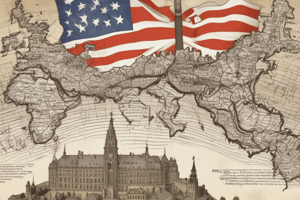Podcast
Questions and Answers
How is the meaning of appeasement different now from it was in the 1930s?
How is the meaning of appeasement different now from it was in the 1930s?
Back then, appeasement meant to negotiate with another country while now it means to give in to bullying and give them what they want.
What was the policy of appeasement?
What was the policy of appeasement?
The policy of appeasement was giving in to Hitler's demands to avoid war, believing he was a reasonable man who would stop when his demands were met.
Which of the following were arguments for appeasement? (Select all that apply)
Which of the following were arguments for appeasement? (Select all that apply)
- It encouraged Hitler to be aggressive.
- Hitler was standing up to communism. (correct)
- It allowed Germany to grow too strong.
- The USA will not support a war against Germany. (correct)
Which of the following were arguments against appeasement? (Select all that apply)
Which of the following were arguments against appeasement? (Select all that apply)
What do traditional historians say about appeasement?
What do traditional historians say about appeasement?
What do revisionist historians say about appeasement?
What do revisionist historians say about appeasement?
What do counter-revisionist historians say about appeasement?
What do counter-revisionist historians say about appeasement?
Flashcards are hidden until you start studying
Study Notes
Meaning of Appeasement
- In the 1930s, appeasement meant negotiating with another nation to maintain peace and avoid conflict.
- Currently, appeasement is perceived as yielding to bullying or aggressive demands, compromising one's principles.
Policy of Appeasement
- The policy involved conceding to Hitler's demands to prevent war, based on the belief that he was rational and would halt aggression if his desires were met.
- Key instances of appeasement included the Sudeten crisis and the invasion of Czechoslovakia, which demonstrated the failure of this strategy.
Arguments for Appeasement
- Hitler was perceived as resisting the spread of communism, framing him as a bulwark against a greater threat.
- The policy allowed Britain to prepare for potential military conflict while delaying immediate war.
- There was a strong desire to avoid repeating the catastrophic losses of World War I.
- Many believed the United States would not support a war against Germany, reducing alliances.
- There was a general consensus that the Treaty of Versailles was unjust and needed reevaluation.
Arguments Against Appeasement
- Appeasement emboldened Hitler, encouraging further aggression and expansionist policies.
- It exposed a lack of experience and decisiveness in British international politics.
- The strategy enabled Germany to strengthen militarily, significantly underestimating its capabilities.
- It contributed to the signing of the Nazi-Soviet Pact, as appeasement pushed both powers closer together.
Historians' Perspectives on Appeasement
- Traditional historians of the 1940s and 50s regarded appeasement as an act of cowardice that directly facilitated the outbreak of World War II.
- Revisionist historians in the 1950s acknowledged appeasement as a contributing factor but understood it within the context of limited resources available to Britain.
- Counter-revisionist historians in the 1990s argued that Britain had limited options, although they criticized the execution of appeasement as inadequate and poorly strategized.
Studying That Suits You
Use AI to generate personalized quizzes and flashcards to suit your learning preferences.




